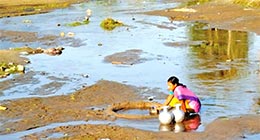The United Nations 2023 Water Conference in New York City ended with over 700 commitments to make the world water-secure, according to a statement. The three-day summit ended on March 24, 2023.
“The commitments at this Conference will propel humanity towards the water-secure future every person on the planet needs,” UN Secretary-General António Guterres stated during the closing ceremony.
The commitments were captured in the Water Action Agenda, the key outcome of the Conference. They were made by countries in Asia and the Pacific, Europe, North America and Africa.
As many as 4 billion people experience water shortages for at least one month a year, expected to rise to 5 billion by 2050. Currently, 25% of the population lives in countries facing extremely high water stress, says a post from the World Resources Institute.
The US announced a commitment of up to $49 billion in investments to support climate resilient water and sanitation infrastructure and services. India has commitments of over $240 billion.
Gajendra Singh Shekhawat, Union minister of Jal Shakti, who represented India at the conference said the country’s commitment to International Decade of Action for Water for Sustainable Development is unwavering.
“It (India) has committed investments of over $240 billion in the water sector and is implementing the largest dam rehabilitation programme in the world as well as efforts to restore groundwater level,” Shekhawat said at the plenary.
Japan announced that it will proactively contribute to the solution of water-related social issues faced by the Asia-Pacific region by developing “quality Infrastructure”, providing financial assistance worth approximately 500 billion yen ($3.65 billion) over the next five years.
Another Asian nation, Vietnam, pledged to develop policies for major river basins management by 2025 and to ensure all households would have access to clean running water by 2030.
African heads of state took a lead at the event by announcing presidential compacts or commitments.
The Government of Mozambique, for instance, committed to taking all necessary steps to accelerate achievement of the UN Sustainable Development Goal (SDG) 6 by 2030 with investments of $9.5 billion. SDG 6 deals with Clean Water and Sanitation.
The Niger Basin Authority (NBA) and the German Federal Ministry for the Environment, Nature Conservation, Nuclear Safety and Consumer Protection made a joint commitment of $21.2 million in funding for a project that strengthens the NBA and its member countries.
The African Union Commission, along with the Continental Africa Investment Programme (AIP), aims to close Africa’s water investments gap by mobilising at least $30 billion per year by 2030 through a range of initiatives.
In Europe, the EU aims to support the access of 70 million individuals to an improved drinking water source and/or sanitation facility by 2030. The bloc will also support Member States with €20 million in funding to accelerate the deployment of wastewater surveillance for COVID-19.
Switzerland, a non-EU nation, submitted five commitments to contribute to the UN’s work, including in the areas of the Water Convention and trans-boundary cooperation.
Over 50 leading global companies also united to make collective commitment to SDG 6 at the meet.
REPORT BY INTERN SIMON MARBANIANG BASED ON AVAILABLE MEDIA REPORTS



Hope these commitments and agreements will bectranslated intimate actions. Specially in far distant villages of India, where even today Women struggle to avail of water